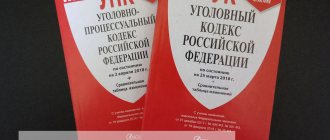Legal encyclopedia "MIP" » criminal lawyer » Article 115 of the Criminal Code of the Russian Federation - causing minor harm to health. Lawyer's comments
Sign up for a consultation with the head of the criminal department. We specialize in Article 115 of the Criminal Code of the Russian Federation. Professional explanations. Unlimited consultation time
In Russian criminal legislation, harm to health is a violation of the anatomical integrity and physiological function of human organs and tissues as a result of exposure to physical, chemical, biological and mental environmental factors.
Liability for intentional infliction of minor bodily harm
- Intentional infliction of minor harm to health, causing short-term health disorder or minor permanent loss of general ability to work, is punishable by a fine in the amount of up to forty thousand rubles or in the amount of the wages or other income of the convicted person for a period of up to three months, or by compulsory labor for a period of up to four hundred eighty hours. , or correctional labor for up to one year, or arrest for up to four months.
- The same act committed:
a) for hooligan reasons;
b) for reasons of political, ideological, racial, national or religious hatred or enmity, or for reasons of hatred or enmity towards any social group; Information about changes: Federal Law No. 227-FZ of July 21, 2014 added paragraph “c” to Part 2 of Article 115
c) using weapons or objects used as weapons;
d) in relation to a person or his relatives in connection with the performance of official activities by this person or the performance of public duty
Punishable by compulsory labor for a term of up to three hundred sixty hours, or correctional labor for a term of up to one year, or restriction of liberty for a term of up to two years, or forced labor for a term of up to two years, or arrest for a term of up to six months, or imprisonment for a term of up to two years.
Do you need the help of a lawyer under Article 115 of the Criminal Code of the Russian Federation?
Sign up for a free consultation with a criminal lawyer
+7
Composition of PTVZ that resulted in death
Article 111 of the Criminal Code of the Russian Federation has a complex composition, characterized by the presence of two forms of guilt. The first three parts of the article imply exclusively intent, while the fourth part contains a careless form of guilt. Overall the composition is intentional.
- The subject is a sane person who has reached 14 years of age.
- The subjective side - as noted above, negligence specifically for part four.
- The object is human health and life.
- The objective side is the act that caused the corresponding harm to health, the presence of a causal connection.
Moscow
Saint Petersburg
Free consultation
Moscow
Saint Petersburg
Lawyer's comments to Art. 115 of the Criminal Code of the Russian Federation
Qualification
Responsibility for intentionally causing minor harm to health occurs under the commented article if one of two signs is present:
a) if the actions of the perpetrator caused a short-term health disorder;
b) if the result is a minor permanent loss of ability to work. Responsibility for beatings is included in a separate article. 116 of the Criminal Code, which also equates to beatings “the commission of other violent actions that caused physical pain, but did not entail the consequences specified in Article 115 of this Code.” This category also includes minor bodily injuries that “did not result in health problems,” which were previously qualified under Part 2 of Art. 112 of the Criminal Code of the RSFSR.
Health disorder and disability
- A health disorder lasting no more than three weeks (21 days) is considered short-term. The duration of a health disorder is usually determined by the number of days of temporary incapacity for work on a sick leave certificate. Minor permanent disability is understood as a permanent loss of general ability to work in the amount of 5%.
Federal Law No. 162-FZ of December 8, 2003 supplemented the article with Part 2, establishing liability for the same acts committed out of hooligan motives. This is due to the exception from Part 1 of Art. 213 of the Criminal Code of the Russian Federation such a sign of criminal hooliganism as the use of violence against citizens. This increases the responsibility for committing a crime under commented Article 115 of the Criminal Code of the Russian Federation, if it is committed out of hooligan motives. Federal Law of July 24, 2007 N 211-FZ “On amendments to certain legislative acts of the Russian Federation in connection with the improvement of public administration in the field of countering extremism”, part 2 of the commented article is supplemented with paragraph “b”, identical to paragraph “e” h .2 tbsp. 111 and paragraph “l” of Art. 105 of the Criminal Code of the Russian Federation.
On the pages of our website we provide complete and universal instructions on the sequence of actions in case of violation of your rights. However, only a few can independently and fully cope with the task of protection. The slightest errors in the procedure can lead to irreversible consequences that will be impossible to correct. The MIP Legal Group includes qualified, experienced lawyers in all areas of law who will help resolve any issues. You can always use the services of a criminal lawyer and be confident in the result.
Commentary to Art. 113 Criminal Code
1. According to the main objective and subjective characteristics, the analyzed crime coincides with the act provided for in Art. 107 of the Criminal Code. The differences lie in the object of the crime (it is recognized as human health) and in the socially dangerous consequences (they are serious harm to health and moderate harm).
2. Infliction of grievous or moderate harm to health by two or more victims in a state of passion is qualified under Art. 113 of the Criminal Code, and such a state of the perpetrator must be caused by the unlawful or immoral behavior of both victims.
3. In qualifying the infliction of grievous bodily harm in a state of passion, resulting in the death of the victim through negligence, at least four options are possible. It seems that in this case it would be correct to prosecute the perpetrator only for causing grievous bodily harm in a state of passion (Article 113 of the Criminal Code), since it is unlikely that in such a state the person could have foreseen that his actions would lead to the death of the victim. In a state of strong emotional excitement, the guilty person’s field of consciousness narrows and, as a rule, he foresees only the immediate consequences of his actions. In addition, when qualifying an act according to the totality of Art. 113 and 109 of the Criminal Code, a person will be punished more severely than, for example, in the case of murder in a state of passion. Judicial practice also qualifies what was done in the situation under consideration only under Art. 113 CC.
The concept of privileged corpus delicti
The Russian criminal legal framework establishes the privilege of the crime. In cases where grievous bodily harm was caused through negligence and in the presence of affected circumstances, the liability of the offender will be reduced.
A privileged crime refers to the composition of an unlawful act that has certain circumstances considered by the Criminal Code of the Russian Federation as mitigating. Thus, if it is established that the crime was committed for some reason due to which the offender was not aware of what was happening, or which was caused by provocative actions on the part of the injured party, then in such a situation mitigating circumstances will be established that will significantly weaken liability violator for the damage caused.
It is worth noting that the legislation regulates all the conditions under which a crime can be classified as an unlawful act with a privileged composition. All these factors are considered and analyzed by a special part of the Criminal Code of the Russian Federation.
Causing harm to health is a criminal offense. And if there is a threat to a person’s life, then in relation to the violator who caused the danger to appear, responsibility and fair punishment will be established, which corresponds to the norms of the Criminal Code of the Russian Federation. However, if the court establishes the presence of certain factors that may become the basis for mitigating the punishment, then responsibility will be reduced and the punishment will be determined taking into account the circumstances that have arisen.
As a measure of punishment, such types of liability as financial compensation for damage, compensation for material damage caused by criminal acts, forced referral for treatment, community service, which will result in compensation for damage if it was caused to society, etc. d.
Concept
Based on the fact of the committed act inflicting grievous and moderate harm to health , the crime is qualified by Articles 111 and 112 of the Criminal Code of the Russian Federation. In relation to these crimes, liability is provided not only for the actual injuries and mutilations to the victim, but also for the intentionality of the actions . Intention may also include the inability to foresee the consequences of the violence committed.
Actions in a state of passion, regardless of the severity of the harm caused to health, will be considered under Article 113 of the Criminal Code of the Russian Federation , but only if the designated state is proven as the reason that pushed the perpetrator to commit a crime.
This article gives the right of advantage to the criminal based on provocation from the victim .
The objective side of the crime will be presented by the facts:
- blows, beatings , etc., from the perpetrator;
- the presence of bodily injuries to the victim;
- time and place;
- the presence of third parties - witnesses to the crime;
- objects with which the aggressor struck or performed other actions.
But a complete objective characteristic will also be created by the presence and cause of the state of aggression , which could be caused by a state of passion, and, accordingly, the presence of provocation . This form of crime is different from similar crimes.
There is no clear dividing line between the objective and subjective sides of the crime. The subjective perception of the situation by the criminal here burst into the objective order of the crime picture.
The subjective side of a crime is characterized by the personality of the criminal . In this case we mean:
- reaching the age of 16 years or the age of majority;
- mental capacity;
- general mental state;
- social adaptability;
- tendency to show aggression in other situations.
The action must be performed spontaneously, in a state of uncontrollable and uncontrollable anger , which is characterized by passion. And if there were motives or goals, then there was a decision to commit an offense.
The corpus delicti consists of the facts of violence shown to the victim, which led to severe or moderate harm to health.
A society that is committed to protecting the health of its citizens provides punishment for committing violence against a person’s personality in general, and in particular in cases where it is based on an uncontrollable state (affect).
At the same time, affect can be caused not only by provocation towards the criminal, but also his close relatives, friends, etc.
general information
A state of affect is a state of extreme mental agitation of a person , which deprives him of the ability to concentrate on the arguments of reason and forces him to completely fall under the influence of strong emotions and feelings that overwhelm him. The state of affect is controlled by physiological processes, so the state of uncontrollable anger is natural.
The actions of a person in a state of passion cannot be equated with the actions of an insane and, therefore, incapacitated person. Despite this, the Criminal Code of the Russian Federation considers such a condition a mitigating circumstance when initiating a criminal case.
A state of affect is qualified by the fact that it is always provoked by external circumstances that a person could not resist.
It is especially scary in this regard when a person, living at the limit of his strength, is faced with treachery, betrayal or meanness that he could not foresee. beatings and humiliation towards him It is possible that he faced a threat to the life of himself or someone close to him.
A state of passion can only be considered a state of strong nervous and mental arousal , which was provoked by the immoral or illegal actions of the injured party.





